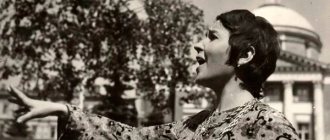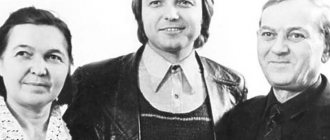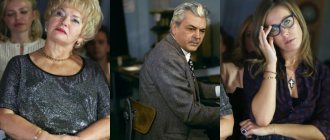Biography of Galina Vishnevskaya. Childhood
In 1926, the great and unique Galina Pavlovna Vishnevskaya was born. Her birthplace is Leningrad. The first name of the then unknown girl was Ivanova, but people began to recognize her by her name Galina Vishnevskaya. The biography of her youth is associated with a huge number of difficult periods. When Galina was still a very little girl, her parents decided to file for divorce. As a result, the grandmother had to raise the girl.
According to Galina Vishnevskaya herself, she does not know the biography of her parents, and does not want to know, since for her they are just strangers. All that the actress knew was that her father was repressed during the war. The mother, after thirteen years of separation, did not recognize her child at all. The grandmother was the main support for the future opera diva.
Galina Vishnevskaya - Galina. Life story
1 …161
Galina Pavlovna Vishnevskaya
Galina. Life story
Slava, Olga, Elena
1
A bright sunny day... I’m running through a green emerald meadow - I’m not quite four years old - and following the boys, I jump from a steep bank into a river... The muddy green color of the water remains in my memory forever, I’m standing at the bottom, clenching and unclenching my outstretched palms. the surface of the hands - probably to grab onto something... The adults saw my hands from the shore and pulled me out. I probably didn’t have time to get scared, but I remember that my mother gave me a good beating. And I cried and didn’t understand why they scolded me, but not the boys. Why can they dive, but I can’t? How is it that I can’t swim? If they can do it, that means I can do it too! This was probably the first time I tried to defend my human dignity and right to freedom of action.
This summer - 1930 - I live with my mother and father “at the dacha”, in a small village. They took me from my grandmother to stay.
I don’t remember my attachment to my parents - they were always strangers to me. Perhaps because from the very infancy - six weeks - my grandmother took me in to raise me and throughout my childhood I heard the pitiful word “orphan” addressed to me.
My mother is half Gypsy, half Polish: her mother was a Gypsy, but I never knew my maternal grandparents - they died before I was born.
When my father first saw his future wife, he was only 20 years old, and she was not even eighteen. Not long before, having broken up with her former lover, pregnant by him, she was then experiencing her first life drama. My father fell in love with her and married her. Soon she gave birth to a son, and two years later I appeared. The mother was very beautiful - medium height, black-eyed blonde, with long, slender legs. I remember her amazingly beautiful hands. But I always admired her from the outside, she was never “mine.”
Probably, from her - in my blood - the passion for singing was passed on to me: she played the guitar, sang gypsy romances, and I, of course, repeated “Black Eyes”, “Turquoise Rings” or city romances after her. It used to be that guests would gather, and then immediately: “Galya, sing!” In such cases, for some reason I crawled under the table. I was not at all afraid of the audience - on the contrary, I felt the need for it very early: singing for myself was not interesting, I needed empathizers, sympathizers. But, probably, I wanted a special, mysterious atmosphere, I wanted to escape reality and create my own world. And then from under the table comes: “Black eyes, passionate eyes, burning and beautiful eyes...” I’m only three years old, but my voice is like an adult’s. I was born with a natural voice, and it was strange for those around me to hear such a strong chest sound produced by the throat of a very little girl. Hearing the applause, I crawled out from under the table, bowed and, inspired by success, began to imitate what I was singing. Here's an example of a song:
A girl from a small tavern was loved by a stern captain, a girl with the eyes of a wild chamois and a smile like the night fog.
I performed this “masterpiece” standing on a chair - such a mise-en-scène seemed very effective to me, because when the hour of death of the unfortunate girl “with the eyes of a wild chamois” approached, you could throw yourself into the sea from the lighthouse (that is, from the chair to the floor) and portray a drowned woman. Everyone was delighted. Immediately I danced the gypsy dance, shook and moved my shoulders and shouted: “Chavella!”
The mother, naturally musical, had a small, pleasant voice. God blessed my father with a wonderful dramatic tenor. He once dreamed of becoming a singer, but, like many Russian people, he was susceptible to a very common “weakness” - drunkenness.
When he got drunk, he loved to sing Herman’s arioso from “The Queen of Spades”:
What is our life? - A game!
That single year that I lived with my parents left in my memory only a few short, but clearly remembered episodes for the rest of my life.
Here I am sitting at the window of our “dacha”. This is the same hut as all the others in the village, only clean, with chintz curtains on the windows, and even with city furniture. It’s autumn slush, it’s raining, but people are running along the street, shouting and crying. From the open doors of the hut opposite, some men are dragging out bundles, pots, blankets, pillows and throwing them into a cart drawn by a skinny horse. The owner of the hut is standing nearby; the roaring children with whom I always play on the street have grabbed her hem. And their grandmother is rushing and howling near the cart. She grabbed the copper samovar with her clumsy hands, and never wants to give it to two hefty men, and she keeps shouting only one thing:
- Herods!.. Herods!.. Herods!..
The picture of that gloomy autumn day was forever etched into my childhood memory: a dirt road, a crowd of peasants, and against their gray-black background - a bright yellow copper samovar, shining in the sun, jumping in the hands of an old woman. And also - hearing the strange word “Herods” for the first time.
Many years later I will understand that this was the beginning of collectivization, “dekulakization,” that my childhood brain imprinted a picture of the ruin of the Russian peasantry.
But my mother and I were walking along a forest road, and suddenly, from a car coming towards us, a man threw out two loaves of bread to us. Mother hides these treasures in her bag, and tells me not to tell anyone. I will meet that stranger later in our house. I understand very well that mother does not love father. When he is not at home, men appear, the mother is completely transformed, becomes even more beautiful. It seems to me that she doesn't love me either. I quietly watch her, spy on her - with some strange instinct I feel that my mother is afraid of me - afraid that I will tell my father. This offends me terribly. When my father is at home, not a day goes by without a scandal - probably the neighbors tell him that in his absence there are often guests.
One night I woke up from a scream: my mother was running around the room in her shirt, and behind her, with an ax in his hand, was a drunken, completely distraught father. I screamed - he probably came to his senses, in any case, the blow fell not on my mother, but on the mirrored cabinet. The roar was terrible, the mirror shattered. My father grabbed me and shouted: “Tell me, who was with mom? What kind of man? What's his name?"
I saw my mother’s huge eyes looking at me - she didn’t beg me to be silent, she just looked at me. Perhaps for the first time I felt that I would never be a traitor - unconsciously, like a little woman, I took my mother’s side, although I was not close to her and knew well “what his name is.”
1 …161
The singer's youth
At the age of sixteen, the biography of Galina Vishnevskaya (her photo is presented) was full of losses, uncertainty and doubts. Her grandmother, unfortunately, could not survive the blockade, which greatly undermined the girl’s morale.
Left completely alone, she managed to get into one of the air defense units. Here the soldiers had the opportunity to enjoy the voice of Galina Vishnevskaya. The biography of her musical creativity received its first wave just in part. At that time, Galya Ivanova was often invited to participate in encouraging concert programs for the military. Her voice sounded both at sea and on land.
After a year of service, the girl was hired at the Vyborg House of Culture. Here, in the biography of Galina Pavlovna Vishnevskaya, a line was written about working as an assistant lighting designer. The war was coming to an end, and life in the city was getting better again. The local music school was one of the first to be restored. Then, without thinking for a second, the great singer Galina Vishnevskaya went to this school to study. From that moment on, her biography opened a new chapter - work in the choir of the Leningrad Operetta. After a short amount of time, Galina brilliantly performed solo parts.
Music in Vishnevskaya's life
The brief biography of Galina Pavlovna Vishnevskaya cannot be described in two words. This is especially true for her musical activities, the turning point in which was 1952. During this period, she managed to pass the casting for the Bolshoi Theater troupe. The fact that she was accepted for an internship was a great success for the singer, because she did not have a classical music education. Her talent immediately captivated the management. And almost from the very first days she had the opportunity to perform the role of Leonora in the opera Fidelio.
Magnificent vocal abilities very quickly turned an ordinary girl into a prima of the Bolshoi Theater. At that time, she owned five main roles in various operas. Until the sixties, she can confidently be called a very successful singer. During this period, the opera diva was sent on tour abroad. There she conquered many American cities, as well as Milan and Paris.
In 1966, a story about working in cinema appeared in the biography of Galina Vishnevskaya. She was lucky enough to play the main role in Shostakovich’s work “Katerina Izmailova”. In the same year, the singer graduated from the Moscow Conservatory as an external student.
Galina Vishnevskaya: “I wouldn’t want to replay anything in my life”
Today the heart of the great singer Galina Vishnevskaya stopped. In recent years, illness seemed to haunt her, especially after the death of Mstislav Rostropovich.
“In the year and a half after Slava’s death, I suffered from pneumonia five times. Nothing passes without a trace,” Galina Vishnevskaya once told us. Galina Pavlovna returned from Germany at the end of last week.
And on Monday her eldest daughter Olga arrived from Baku. The capital of Azerbaijan hosted the annual international festival named after Rostropovich. Olga shared her impressions with her mother in detail. Who would have thought at that hour that this was their last conversation...
The next day, Galina Pavlovna passed away.
With Naina Yeltsina and daughter Olga
The farewell ceremony for the People's Artist of the USSR, full holder of the Order of Merit for the Fatherland, will take place on December 13 at the Opera Singing Center (Ostozhenka St., 25, building 1). The funeral service will take place on December 14 at the Cathedral of Christ the Savior. Galina Pavlovna will be buried at the Novodevichy cemetery next to her husband.
Russian President Vladimir Putin expressed condolences to the family and friends of the Soviet and Russian singer.
Dmitry Medvedev also expressed condolences over the death of the singer.
WORDS OF FAREWELL
Yuri Luzhkov about Galina Vishnevskaya: “I called her queen”
“It is with great pain and great regret that I speak about this misfortune,” Luzhkov told us. “This is a misfortune for loved ones, a misfortune for friends, a misfortune for our entire country.” This is a tremendous loss for national and world culture.
I called her Queen. She was a true Queen of Vocals. She carried the amazing principles of decency, the greatness of a Woman and the greatness of the Teacher that Russia and all world art received after those incredible trials that befell Galina Pavlovna not through her fault, but because of the dishonest actions of the authorities of our country. Against her will, she was forced to leave the country, but even despite the fact that she was accepted in the West with open arms, and she gained unique recognition there from the world community - together with her husband, Slava Rostropovich - they always strived to be close to their native country, to be close to her people.
At Galina Vishnevskaya's birthday party October 25, 2012
Elena Obraztsova: “Time had no power over her”
— We saw Galina Pavlovna for the last time at the opening of the Bolshoi Theater after reconstruction. She was still very good and time had no power over her... She, of course, left the stage a long time ago, but we often met at social events. She was an outstanding singer and this is an incommensurable loss for art. I'm sitting here now and crying...
We worked a lot with her, sang a colossal number of operas. She was inquisitive, unlike anyone else, completely individual. Galina Pavlovna sang both Western music and modern composers, and performed many works by Shostakovich and Prokofiev. Shostakovich and Britten dedicated their works to her and she was their first performer. I am grieving, this is an irreparable loss.
Boris Nemtsov about Galina Vishnevskaya: “There are no such people anymore. Everlasting memory"
— Galina Pavlovna Vishnevskaya passed away... I was lucky enough to communicate with this legendary and extraordinary woman many times. One episode is etched in my memory. '95 Slava Rostropovich and Galina Vishnevskaya came to Nizhny to participate in the Sakharov Festival. We decide to build a maternity hospital together. Galina Pavlovna insists that this should be in rural areas, where the birth rate is low and young people run wherever they can, just to get away from hopelessness.
We chose the regional center of Vachu. We agreed that I, as governor, am responsible for construction, and the Rostropovich-Vishnevskaya Foundation is responsible for obstetric equipment and training of medical personnel. Within a year, a maternity hospital was built, and unusual New York-Vacha containers with modern medical equipment from Vishnevskaya-Rostropovich appeared in Vacha.
Rural doctors completed internships in the best clinics in the USA. Summer 96. July. Opening of the maternity hospital. Tsarina Galina arrives in a dress like Empress Catherine's. The three of us are walking along Vacha. Dirt, dust, flies all around. Galina Pavlovna looks at Slava and me clearly not in a friendly manner. And broadcasts
-You fools, you fools, why the hell were they building a maternity hospital here??! Look every day, and the men all around are drunk, incapable of anything. Not suitable for childbearing. And then Slava says to her: What about Boris and I?? We specifically chose the place so that there would be no competition)))).
And then I saw Galina Pavlovna in anger... It was scary. The queen hurled thunder and lightning backhanded, harshly and majestically. Slava immediately became small and obedient. For a long time we calmed her down, calmed her down... Queen Galina had so much passion and expression, so much strength and talent... There are no others like her. Everlasting memory….
1966 Galina Vishnevskaya as Lisa in the opera P.I. Tchaikovsky's "Queen of Spades" Photo: RIA Novosti
Oleg Tabakov: “Galina was a person in the full sense of the word...”
“We saw each other just a month ago, at the Conservatory. And to say that it was and is not is stupid and painful...
She was one of the few people in our theater guild who defended human dignity during the years of socialism, who never did anything she didn’t want.
Galina is from a very narrow circle of brothers in the acting profession who have kept themselves safe and sound.
She lived in the USSR, was expelled from this country, and when she returned, she loved her land and her Motherland no less, and did as much as she could to glorify Russia.
Hamlet said about his father: “He was a man in the full sense of the word!” I would like to say these words about Galina. Bright memory…"
Alexander Sokurov: “I loved her very much!”
Six years ago, Alexander Sokurov made a documentary film “Elegy of Life” about Galina Vishnevskaya, and a year later his feature film “Alexandra” was released, where the singer played the main role. This film was the last for Galina Pavlovna.
“I don’t know what to say...” the director couldn’t hold back his tears. “I’m desperate, hurt and bitter.” Desperately offensive and bitter. I loved her very much...
Oleg Tabakov about Galina Vishnevskaya
00:00
00:00
Private bussiness
Galina Pavlovna Vishnevskaya (née Ivanova), People's Artist of the USSR, was born in Leningrad on October 25, 1926. She survived the blockade, and at the age of sixteen she served in air defense units. In 1944 she entered the Leningrad Regional Operetta Theater.
First marriage (two months) - with military sailor Georgy Vishnevsky. The second is with the director of the operetta theater, Mark Rubin.
In 1952 she was accepted into the Bolshoi Theater, where she performed more than 30 roles, including Tatiana in Eugene Onegin and Lisa in The Queen of Spades, Kupava in The Snow Maiden, Donna Anna in The Stone Guest, Aida in the opera Verdi, parts in Tosca, etc.
In 1955, four days after they met, she married for the third time - to cellist Mstislav Rostropovich. In 1974, she was forced to go on a long tour abroad with him (as a result of persecution of Rostropovich for supporting Alexander Solzhenitsyn), and lived in the USA and France. Vishnevskaya and Rostropovich were deprived of Soviet citizenship. In 1990, this decree was canceled, and they returned to Russia. The couple lived together for 52 years.
Since 2002 - head of the Galina Vishnevskaya Center for Opera Singing in Moscow.
Anna Akhmatova, impressed by Galina Vishnevskaya’s singing, wrote a poem
"FEMALE VOICE"
A woman's voice rushes like the wind, It seems black, wet, night, And whatever it touches on the fly Everything immediately becomes different.
Fills it with a diamond radiance, Somewhere somewhere turns silver for a moment And rustles with a mysterious robe of unprecedented silks.
And such a mighty force, an enchanted voice, attracts, As if there was not a grave ahead, but a mysterious flight of stairs.
And to sparkle, you have to have talent, I don’t know any other way. Photo: RIA Novosti
Foreign wanderings
The decline of Vishnevskaya’s career as an opera singer occurred in 1960. The main reason for this was the fact that Vishnevskaya, together with her third husband Rostropovich, strongly supported Solzhenitsyn, who was expelled from the Writers' Union at that time.
They began to write about Vishnevskaya in a negative way in the print media, she was forbidden to tour and record new records. Vishnevskaya saw her last chance in going abroad. The singer’s husband was the first to go west “on reconnaissance.” Then, under the pretext of a long trip, she herself left. The daughters of Galina Vishnevskaya, whose biography is touched upon in the “Personal Life” section, went on a trip with their parents.
The first location of this family was France. Then they lived a little in America and England. As a result, the decision was made to purchase their own home in the territory of their beloved France. In this regard, USSR citizenship was taken away from the family of Galina Vishnevskaya. In the biography, the singer’s nationality is indicated as Russian, but her citizenship at that time became French. Vishnevskaya was not worried about this. In France she performed on the best stages, here she was adored and appreciated. Having completed her opera career, she began staging performances. Also important in her work was the writing of memoirs, the first of which was published in Washington.
Galina Vishnevskaya in exile
At the end of the sixties, Galina Pavlovna's family supported Alexander Solzhenitsyn, who at that time was expelled from the Writers' Union. This was the reason why they stopped writing about Vishnevskaya in magazines and newspapers, although she continued to sing from the stage of the Bolshoi Theater.
Soon her tours were banned; she was not allowed to travel abroad or record records. All this became the reason that Galina Pavlovna persuaded her husband to go abroad. This was in the spring of 1974. First, Mstislav Rostropovich, who was the singer’s husband, went on a foreign tour, and later Vishnevskaya followed him with her daughters. Officially, it was formalized as a long business trip abroad. In fact, they had no intention of returning. The family lived in France, the USA and the UK. When it became known in the Union that Vishnevskaya and her husband bought an apartment in Paris, they were deprived of Soviet citizenship.
After some time, Rostropovich was invited to the USA. The National Symphony Orchestra offered him the position of chief conductor. The family moved after him. Galina Pavlovna always performed on the stages of the best theaters. Only in the mid-eighties did the brilliant singer stop going on stage, ending her career with a performance at the Grand Opera in Paris. She began staging plays, acting as a director, teaching, acting in films and writing memoirs.
Thousands of fans of the singer's talent gathered at the funeral of Galina Vishnevskaya
Her book was published in Washington and was called “Galina”. It, with a view to a foreign reader, described life in the Union, thanks to which readers, as Galina Pavlovna put it, could understand what Russia is.
Career development in Russia
Since 1993, Vishnevskaya began working at the Chekhov Theater. Here she got several leading roles. Nine years later she had the opportunity to take up the post of head of the Moscow Opera Center. For Vishnevskaya, this was the main thing of her life; she always dreamed of doing exactly this and was happy that she achieved this goal. She taught at her center five days a week. On weekends she conducted additional master classes. Tickets sold quickly, people bought them in a matter of minutes.
In 2007, another important event occurred in Vishnevskaya’s creative life - she starred in the leading role in the film “Alexandra.”
Personal life
In the biography of Galina Vishnevskaya, marriage fit into her youth. The simple but talented girl was 17 years old at the time. Her chosen one was a long-distance sailor named Georgy Vishnevsky. The marriage turned out to be short-lived and lasted only a few months, but the surname of the first spouse went with the singer throughout her entire life.
Vishnevskaya’s second marriage happened to Mark Rubin. The husband was more than twenty years older than the singer. In marriage, Galina Pavlovna had a son, Ilya, who passed away while still a baby. She lived with Rubin for ten years and, perhaps, would have lived further, but another man appeared on her way.
Meeting Mstislav Rostropovich at a youth festival forced Vishnevskaya to completely change her life. She very quickly married him and gave birth to his wife two daughters. The star spouses lived together for more than fifty years. Their life was long and truly happy, as they doted on each other. You can learn more about their happy life from the documentary film “Two in the World.” The singer’s most important words are that despite all the persecution and difficulties in their lives, the couple’s family relationship was ideal. Vishnevskaya would never want to change anything.
Memorable places
The era of Galina Vishnevskaya was full of bright events, incredible roles and fascinating roles. The memory of the great singer lives to this day. The following objects are named in her honor:
- Vishnevskaya Street - located in Novokosino. This decision was made in 2013 by the Moscow government.
- Liner "G. Vishnevskaya" is the name of one of the airbuses.
- Vishnevskaya College is located in Moscow. Field of activity: music and theater arts.
- Galina Vishnevskaya Music School is located in Kronstadt.
- Minor planet - a solar system object number 4919 is named after Galina Pavlovna Vishnevskaya.
Memory[ | ]
Airbus A321 airliner "G. Vishnevskaya"
The following are named in honor of G. Vishnevskaya: [ source not specified 1477 days
]
- Galina Vishnevskaya Street in the Moscow district of Novokosino. On June 26, 2013, the Moscow Government decided to give the projected passage No. 326, located in the Novokosino district of the Eastern Administrative District of Moscow between Suzdalskaya and Novokosinskaya streets, the name Galina Vishnevskaya Street[33].
- Galina Vishnevskaya Street in Vidnoye, Moscow Region.[34]
- Airbus A321 airliner "G. Vishnevskaya"[35]
- College of Musical and Theater Arts No. 61 named after G. Vishnevskaya in Moscow[36]
- Children's music school No. 8 in Kronstadt is named after G. Vishnevskaya.
- Minor planet of the solar system No. 4919 is named after G. Vishnevskaya[37]
- A memorial plaque to Mstislav Rostropovich and Galina Vishnevskaya was unveiled in Moscow in 2020. Installed on Gazetny Lane, on the house where the couple lived.
- Media files on Wikimedia Commons
Awards
Vishnevskaya’s honorary titles and awards are very difficult to count.
The singer first received the title of Honored Artist of the RSFSR in 1955. Then she was given the title of People's.
She also has ten medals of various levels in her collection. These include medals “For the Defense of Leningrad” and “Veteran of Labor”.
Galina Pavlovna was also awarded orders of varying degrees five times. Among them are the Order of Lenin and the Order of Merit for the Fatherland.
While living in France, the singer was presented with a variety of awards. Among them are the Order of the Legion of Honor and the Diamond Medal of the City of Paris.
Honorary titles and awards
Honored Artist of the RSFSR (1955) People's Artist of the RSFSR (1961) People's Artist of the USSR (1966) Prize of the Government of the Russian Federation in the field of culture for 2011 - for creating a school of opera singing Prize of the Government of St. Petersburg (2008) - for playing the main role in the film " Alexandra"
Letter of Gratitude from the President of the Russian Federation (October 25, 2001) - for his great contribution to the development of musical art and active charitable activities
Order of Merit for the Fatherland, IV degree (2011) - for his great contribution to the development of national musical culture, many years of pedagogical and educational activities
Order of Merit for the Fatherland, III degree (1996) - for great personal contribution to the development of musical art
Order of Merit for the Fatherland, II degree (2006) - for outstanding contribution to the development of musical art and many years of fruitful creative activity
Order of Merit for the Fatherland, 1st class (December 1, 2012) - for outstanding contribution to the development of national culture and musical art
Order of Lenin (1971) Medal “For the Defense of Leningrad” (1942) Medal “In Commemoration of the 100th Anniversary of the Birth of Vladimir Ilyich Lenin” Medal “50 Years of Victory in the Great Patriotic War of 1941-1945.” Medal "60 Years of Victory in the Great Patriotic War 1941-1945" Medal "65 Years of Victory in the Great Patriotic War 1941-1945" Medal "For Valiant Labor in the Great Patriotic War 1941-1945" Medal “Veteran of Labor” Medal “In Commemoration of the 850th Anniversary of Moscow” Medal “In Commemoration of the 250th Anniversary of Leningrad” Medal “In Commemoration of the 300th Anniversary of St. Petersburg” Officer of the Order of Arts and Letters (France, 1982) Commander of the Order of the Legion of Honor (France) , 1983) Order of the Holy Equal-to-the-Apostles Princess Olga, 1st degree (ROC, 2004)
Order of the Venerable Euphrosyne, Grand Duchess of Moscow, II degree (ROC, 2011) - in recognition of the assistance of the Russian Orthodox Church and in connection with the 85th anniversary of her birth
Diamond Medal of the City of Paris (1977) Order of Peter the Great, 1st degree (Academy of Defense Security and Law Enforcement, 2004) Badge of Honor “Silver Cross” (2004, public organization “Union of Georgievka”) International award - Order “For Contribution to Victory” (2005) Tsarskoye Selo Art Prize (2000)
National award for public recognition of the achievements of women in Russia “Olympia” (Russian Academy of Business and Entrepreneurship, 2002 and 2007
International G. Puccini Prize (2002)
National Award “Russian of the Year” (2005) - for selfless and talented service to art, civil courage, strength and generosity of the human spirit
Film award "White Elephant" in the category "Best Actress" (film "Alexandra", Guild of Film Scholars and Film Critics of Russia, 2007) "Crystal Simurgh" Award for the best performer of the 26th International Film Festival "Fajr" (Tehran, 2008) Honorary Doctor of the Russian Chemical Institute -Technological University (2006) Honorary Professor of Moscow State University. Lomonosov (2007) Doctor of Humane Letters honoris causa from River College (Nashua, New Hampshire, USA) Honorary Doctor of Music from Hamilton College (Ontario, Canada) Doctor of Music from St. Lawrence University (Canton, New York, USA) Professor Emeritus Moscow Conservatory Honorary citizen of the city of Kronstadt (1996) Honorary citizen of the Nizhny Novgorod region (2002)
List of the most striking opera roles at the Bolshoi Theater
In total, during her time at the Bolshoi Theater, Galina Pavlovna Vishnevskaya performed more than 20 roles. In her performance, the viewer was able to meet many different characters. Among them:
- Beautiful Tatiana in Tchaikovsky's opera Eugene Onegin.
- The unique Margarita in Gounod’s work entitled “Faust”.
- Soulful Zinka in “The Fate of Man” by Dzerzhinsky.
- Sensual Natasha Rostova in the legendary production by Prokofiev based on the novel by L. N. Tolstoy “War and Peace”.
- Romantic Francesca in the opera Francesca da Rimini
In addition to the Bolshoi Theater, the singer performed in others. She had the opportunity to act in the role of such characters as Iolanta, Liu, Desdemona, Lady Macbeth. As for Vishnevskaya’s filmography, she starred in 4 films. She worked as a voice actor several times. Her works include such opera films as “Eugene Onegin”, “Free Wind”, “Boris Godunov”.
Vishnevskaya also has numerous participations in documentaries. At different times she managed to star in such films as “Our Beloved Young Grandfather”, “The Female Face of War”, “Galina Vishnevskaya. Romance with fame."









